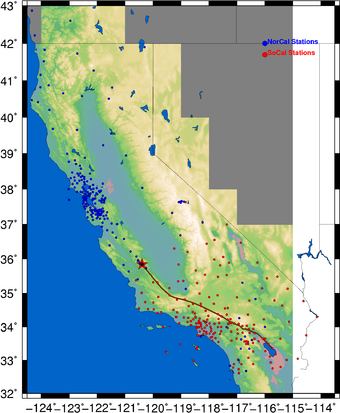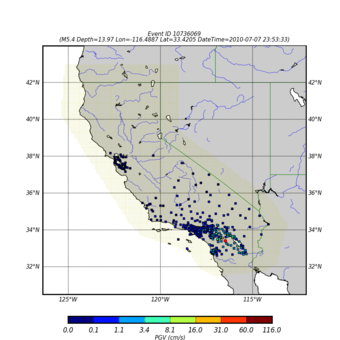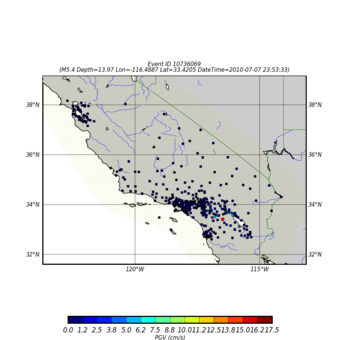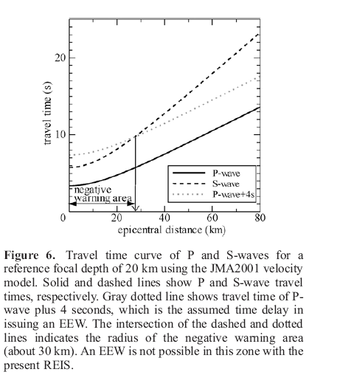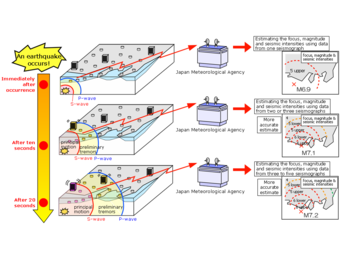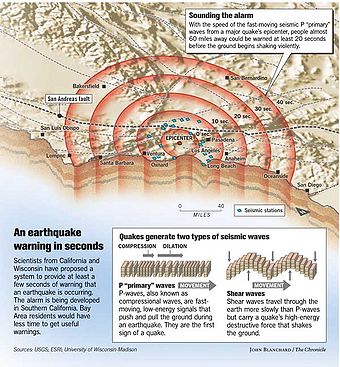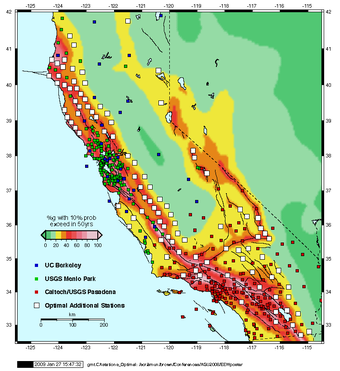Earthquake Early Warning
Contents
SCEC Earthquake Early Warning Activities
SCEC4 science plans emphasize the development and use of time-dependent seismic hazard analysis. SCEC is working to extend time-dependent seismic hazard analysis through application of EEW technologies. SCEC is working with the California Integrated Seismic Network (CISN) in the development and evaluation of a prototype CISN EEW system called the CISN ShakeAlert system.
SCEC is working to developed automated CISN EEW performance evaluation system. This system, currently called the CISN Testing Center (CTC), is based on the testing framework developed on the SCEC CSEP project.
CISN EEW Testing Data Sets
CISN EEW Trigger Summary
- CTC Test Results Directory
- CISN EEW Algorithm Testing Site
- CISN Cumulative Trigger Summary (2008-2010) (15MB Zip File containing 75MB html File)
CISN EEW Station Lists
CISN provided the following list of stations used in current CISN EEW processing
- Northern CISN Station List
- Southern CISN Station List
- Combined CISN EEW Station List (KML Format)
- Southern San Andreas Fault Trace lon/lat (KML format)
The ShakeMap authorized data source may provide the observational data used to validate short term ground motion forecasts.
- ShakeMap Rss System
- ANSS Seismic Data Center
- SCEC Data Center at Caltech
- Northern California Data Center at UC Berkeley
ShakeAlert CTC Trac System
EEW-Related SCEC Research Documents and Links
2010
- File:CTC 14Oct2010 v6.ppt CISN EEW Workshop Oct 2010 (12MB ppt File)
- CTC Development Plans April 2010 (12Mb pptx)
- M8_EEW_Analysis
- CISN EEW Testing Document (Updated July 2010)
2009
- Fall AGU 2009 (Cua et al)
- Fall AGU 2009 (Hellweg et al)
- Fall AGU 2009 (Maechling et al)
- SCEC Annual Meeting Poster 2009 (Maechling et al)
2008
- CSEP Testing Center Overview (Dec 2008) (Maechling et al) (3MB ppt)
- Prospective Testing Overview (EEW and CSEP) (Maechling et al) (3MB ppt)
- EEW Meeting In Kyoto Poster 2008 (Maechling et al) (PDF)
CTC Abstract for SCEC Annual Meeting 2010
Testing Regional-scale Ground Motion Estimates for the CISN ShakeAlert Project Philip Maechling, Maria Liukis, Thomas H. Jordan
Our SCEC research team has developed initial capabilities of the CISN Testing Center (CTC) as a part of the USGS-funded CISN ShakeAlert Project. The CTC is designed to compare regional-scale ground motion estimates, such as peak ground motion estimates, against observed ground motion data, for significant California Earthquakes. The CTC is designed to identify which ShakeAlert ground motion estimation methods produce the best fit to observed ground motions.
Scientific goals of the CTC include (a) development of consensus among SCEC researchers on meaningful measures of comparison between ground motion estimates and observations, (b) collection and analysis of ShakeAlert performance information, and (c) integration of standard Probabilistic Seismic Hazard Analysis (PSHA) terms and practices into EEW. The technical goal of the CTC is to develop an automated system that can comparing ground motion estimates against ground motion observations. The CTC system used the CSEP testing framework to automate the evaluation of CISN ShakeAlert rapid earthquake parameters including ground motion forecasts for each event.
As part of this year’s CTC development, we updated the CSEP Testing Framework to use the USGS ShakeMap RSS Feed as an authorized source of event-based ground motion observations. As ShakeAlert systems produces rapid ground motion estimates for significant California events, the CTC will evaluate those ShakeAlert ground motion estimates against CISN ground motion observation using goodness-of-fit algorithms defined by CISN scientific groups.
Our ShakeAlert ground motion forecast testing shares scientific and technical goals with several other SCEC activities including validation of attenuation relationships, synthetic ShakeMaps, velocity model and wave propagation model goodness of fit measures, and short term ground motion forecast testing. The CTC system is designed to support CISN ShakeAlert testing and to also be applicable for evaluation of other ground motion estimation methods.
Additional ShakeAlert Information
- CISN Home Page
- USGS ShakeAlert Press Release
- Caltech Seismo Lab
- U.C. Berkeley Seismo Lab
- USGS Pasadena Seismic Network Operations
- USGS Menlo Park Seismic Network Operations
ShakeAlert CTC Software Stack Description
The following packages contribute to the software stack used by EEW software:
- awk
- sed
- java
- python and it's external libraries: matplotlib, basemap, numpy, scipy, xml
